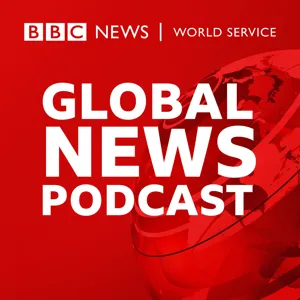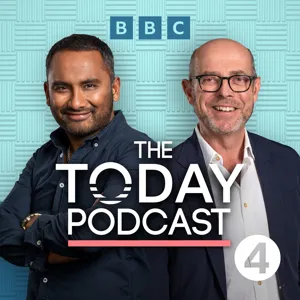Podcast Summary
History and geography of the Israeli-Gaza conflict: The Israeli-Gaza crisis is a longstanding conflict rooted in religious, political, and historical tensions between Jews and Palestinians, with the establishment of Israel in 1948 being a significant turning point leading to displacement and ongoing dispute over the region.
The Israeli-Gaza crisis is a complex conflict rooted in history and geography. The Gaza Strip, a densely populated coastal region on the Mediterranean, is home to approximately 2.3 million Palestinians. It is bordered by Egypt to the south and Israel to the north. Israel controls the airspace, sea, and all land crossings except for the one leading to Egypt. The conflict's origins can be traced back to religious and political tensions between Jews and Palestinians, with the establishment of the state of Israel in 1948 being a significant turning point. This event led to the displacement of many Palestinians and the ongoing dispute over the region. Sydney from Albany, New York, and Lily from Germany, both expressed a desire to learn more about the history of the conflict and its causes. To gain a deeper understanding, it's essential to explore the religious, political, and historical contexts that have shaped the Israeli-Gaza crisis.
The Israeli-Palestinian conflict: A long-standing religious and territorial dispute: The Israeli-Palestinian conflict, rooted in religious and territorial differences, persists due to disputes over land, religious extremism, and the desire for self-determination, with recent tensions escalating due to Hamas' attacks and Israel's response.
The Israeli-Palestinian conflict, which began in the late 19th century with the Zionist movement's desire for a Jewish state in Palestine, has deepened over the decades due to conflicting claims to the land and religious tensions. The British attempted to split the land into two states, but this was not accepted by the Arabs who wanted everything. In 1948, Israel declared its independence and won a massive victory in the subsequent war. However, the conflict has since been marked by religious extremism, with both sides believing they are acting in the will of God. The latest stage of the crisis began with Hamas' unprecedented attacks on Israel, which have been met with strong resistance from Jewish communities worldwide. While religious differences play a role, the primary issues are the harsh conditions in Gaza and the West Bank, Israel's control over Palestinian lives, and the dashed hopes of the Palestinians for self-determination.
Ongoing conflict between Israelis and Palestinians leads to intense violence and clashes: The expansion of Jewish settlements and Hamas attacks continue to fuel tension, leading to ongoing violence and clashes between Israelis and Palestinians, causing fear and instability in the region
The situation between Israelis and Palestinians continues to be complex and volatile, with ongoing conflict leading to intense aerial bombardment and clashes between settlers and Palestinians in the West Bank. The expansion of Jewish settlements and the response to Hamas attacks have been major points of contention. Hamas, which took over in Gaza in 2007, has had varying levels of popularity, with some dedicated followers but not representing all Palestinians who desire their own state. The recent violence and resulting deaths of Palestinian civilians are likely to fuel anger and protests against Israel in the Arab world. Israeli politics remain contentious, with Binyamin Netanyahu leading a pro-settler government. The sounds of artillery and other military activity are a constant reminder of the ongoing conflict, creating a frightening reality for many.
Israeli-Palestinian conflict escalates as Hamas launches rocket attacks on Israel: The Israeli-Palestinian conflict continues to escalate, with Hamas attacking Israel and Iran potentially stoking the flames. Israel's failure to prevent the attack raises questions about its intelligence and imagination, while international support for Israel remains a contentious issue.
The Israeli-Palestinian conflict, fueled in part by the expansion of Jewish settlements, has reached a boiling point, with Hamas launching rocket attacks on Israel. This situation has strained Israeli policy, as Netanyahu had previously shifted to a more anti-Palestinian stance to appease the right. Iran, a major supporter of Hamas and Islamic Jihad, is believed to have an interest in stoking conflict in the Middle East, as tensions between Israel and Saudi Arabia had been cooling, potentially leading to normalized relations between the two countries. Israel's failure to foresee the attack, despite significant resources and technology, has raised questions about the intelligence and imagination of its government. The international community's support for Israel has been a point of contention, with some questioning why Israel, as the occupier, is receiving more backing than the Palestinian people.
The Hamas-Israel conflict: historical tensions and complex realities: The Israeli-Palestinian conflict is a complex issue with deep historical roots, requiring a peaceful, equitable solution that addresses both sides' concerns while acknowledging the realities of regional politics.
The ongoing conflict between Hamas and Israel is complex and deeply rooted in historical tensions. While many find Hamas' actions, such as the attack on a music festival, to be unjustifiable acts of savagery, the context of Israeli violence and Palestinian frustration cannot be ignored. Neighboring Muslim countries, while officially supporting the Palestinian cause, do not necessarily support Hamas due to its political ideology. Egypt, in particular, is under pressure not to open its borders to Palestinian refugees, as they fear creating a permanent refugee camp. The conflict will continue until Palestinians are governed by leaders who do not seek the destruction of Israel, and Israel stops building settlements on Palestinian land. Ultimately, a peaceful, equitable solution is desired by all involved, but finding that solution remains a significant challenge.
Media reporting guidelines for Middle East conflicts: Avoid using loaded terms like 'terrorist' or 'state terrorism' in reporting on Middle East conflicts. Instead, focus on clarity and accuracy in describing actions and motivations of parties involved. Use terms like 'hostages' instead of 'prisoners of war' to acknowledge human cost.
Language used by media organizations, particularly in reporting on complex and sensitive conflicts like the ongoing situation in the Middle East, can be a source of controversy and criticism. During a discussion on the BBC's reporting guidelines, it was emphasized that the use of loaded terms like "terrorist" or "state terrorism" can be misleading and divisive. Instead, the focus should be on clarity and accuracy in describing the actions and motivations of the parties involved. For example, the BBC avoids labeling Hamas as terrorists, instead opting to describe their actions and beliefs. Similarly, the term "hostages" is used to refer to those captured in the conflict, rather than "prisoners of war," due to the clear conventions of war and the human cost involved. Ultimately, the goal is to provide clear and accurate information to listeners, while respecting the conventions of war and avoiding inflammatory language.
Prisoners of War: Noncombatants and Civilians During Conflict: Despite being labeled as 'Prisoners of War' for noncombatants and civilians, innocent civilians in ongoing conflicts like Gaza are targeted, leading to a humanitarian crisis. Efforts to verify information and implement temporary solutions like humanitarian corridors and ceasefires are necessary.
During war, even though the term "prisoners of war" is commonly associated with combatants, noncombatants and civilians, such as reporters and contractors, can also be granted this status if they are affiliated with but not part of a belligerent military. However, in the case of the ongoing conflict in Gaza, innocent civilians, including children and the elderly, are being targeted, resulting in a humanitarian crisis. The use of sieges, cutting off access to water, food, and electricity, is a medieval and brutal tactic that is being employed. Reporting on such crises is challenging, and while efforts are made to verify information, it can be difficult to obtain accurate numbers and videos circulating online need to be fact-checked. A suggested short-term solution to the crisis is the implementation of a humanitarian corridor and a temporary ceasefire, allowing civilians to evacuate to safer areas. Israel, under immense pressure from its own people and allies, is under international scrutiny to adhere to the rule of not targeting civilians and to find a peaceful resolution.
Israeli-Palestinian Conflict: New Violence, Old Problems: The Israeli-Palestinian conflict persists due to unresolved tensions between Palestinian self-determination and Israeli security concerns. Recent violence may lead to renewed negotiations or further escalation.
The Israeli-Palestinian conflict, which has been left to fester for over a decade, has once again erupted into violence. The military operations by Israel are prioritized over humanitarian concerns, raising international concerns about the civilian casualties. The peace process attempts in the 1990s, which aimed for a Palestinian state alongside Israel, failed, leaving the conflict to be managed rather than resolved. The key to a lasting peace lies in finding a compromise between the Palestinian desire for self-determination and Israeli security concerns. The optimistic view is that this latest conflict may jolt all parties into renewed negotiations, while the pessimistic view is that it could lead to further escalation. For Palestinians, control over their own land is crucial for an effective and cohesive state, while Israelis seek separation and independence from Palestinian interference. The question remains, what does Hamas want? Their charter calls for the destruction of Israel, causing significant Israeli anxiety and resistance to negotiations.
Hamas' internal division amidst ongoing conflict: The military wing of Hamas is currently in control, with political leaders caught off guard by recent violence. Global interest in Middle East conflict remains high, and The Conflict podcast offers in-depth coverage. UnitedHealthcare TriTerm plans provide flexible medical coverage during job transitions.
That while there have been indications of Hamas being open to potential agreements with Israel based on principles like the right of Palestinians to return, the recent crisis has highlighted the internal division within Hamas. Political leaders who support moving away from violence were caught off guard by the assault, and the military wing appears to be in control. The ultimate goal of the military wing remains unclear. Despite this, there is a significant global interest in understanding the ongoing conflict in the Middle East, as evidenced by the numerous questions from BBC Global News podcast listeners. The podcast, "The Conflict," provides in-depth coverage and analysis, and listeners are encouraged to continue sending in their questions. Additionally, there are important practical matters that remain constant, such as the need for health insurance. UnitedHealthcare TriTerm medical plans offer flexible, budget-friendly coverage for those in between jobs or who missed open enrollment, providing peace of mind for the uncertain future.






